Died: 8 December, 1980, New York, USA
From the moment he first heard the stuttering of Elvis Presley's "Heartbreak Hotel" in 1956, John Lennon was destined to become a rock 'n' roll star. That he became, along with his partner and competitor Paul McCartney. One of the most influential songwriters of our time was the result of a mysterious blending of his own innate talent and the spirit of his generation.
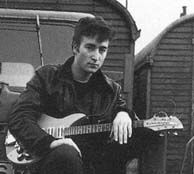 Lennon's quest for stardom, which began with attention grabbing pranks well before high school, appears to have been a legacy of John's home life. Shortly after he was born, his mother Julia, a strong willed and fun loving woman, placed him in the care of his stern but equally strong willed Aunt Mimi. Soon thereafter, his father went off to sea under unknown circumstances that kept him away several years. When he finally returned, John, at age five, was asked to choose between mother and father. Although he asked to remain with Julia, he found himself, once again, in Mimi's care.
Lennon's quest for stardom, which began with attention grabbing pranks well before high school, appears to have been a legacy of John's home life. Shortly after he was born, his mother Julia, a strong willed and fun loving woman, placed him in the care of his stern but equally strong willed Aunt Mimi. Soon thereafter, his father went off to sea under unknown circumstances that kept him away several years. When he finally returned, John, at age five, was asked to choose between mother and father. Although he asked to remain with Julia, he found himself, once again, in Mimi's care.
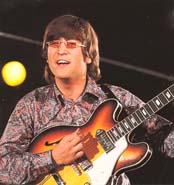 An intelligent and quick witted child, John became a notorius troublemaker at school. In his teens he discovered that his mother, who was living only a short distance away, shared his interest in music and mischief and they became allies against Aunt Mimi's efforts to control his behaviour. When John was seventeen, however, John lost Julia again, this time forever, when she died in a car accident. Many years later, John recognised that his lack of sense of being loved as a child formed the foundation of his compulsion to be publicly adored. It was also the source of occasional explosions of rage that, throughout the 1960s, were kept hidden by the Beatles' management.
An intelligent and quick witted child, John became a notorius troublemaker at school. In his teens he discovered that his mother, who was living only a short distance away, shared his interest in music and mischief and they became allies against Aunt Mimi's efforts to control his behaviour. When John was seventeen, however, John lost Julia again, this time forever, when she died in a car accident. Many years later, John recognised that his lack of sense of being loved as a child formed the foundation of his compulsion to be publicly adored. It was also the source of occasional explosions of rage that, throughout the 1960s, were kept hidden by the Beatles' management.
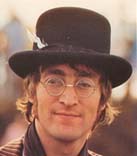 If the Beatles began as John's substitute for parental affection, by 1965 they had come to represent all that was false in the world. Audiences screamed themselves hoarse whether the band played well or poorly. Such embarrassments as paternity suits and episodes of violence were buried beneath large sums of hush money. When John responded by trying to deliver a more honest image of himself ("I'm A Loser", December 1964), he was asked in no uncertain terms to act more like a cuddly teddy bear pop star. Over the latter half of the 1960s, he escaped into drugs, musical experimentation, spiritual quests and finally into his relationship with avant-garde artist Yoko Ono.
If the Beatles began as John's substitute for parental affection, by 1965 they had come to represent all that was false in the world. Audiences screamed themselves hoarse whether the band played well or poorly. Such embarrassments as paternity suits and episodes of violence were buried beneath large sums of hush money. When John responded by trying to deliver a more honest image of himself ("I'm A Loser", December 1964), he was asked in no uncertain terms to act more like a cuddly teddy bear pop star. Over the latter half of the 1960s, he escaped into drugs, musical experimentation, spiritual quests and finally into his relationship with avant-garde artist Yoko Ono.
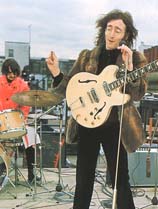 Yoko, whom John met in 1966, reawakened his sense of adventure. With songs such as "A Hard Day's Night" (1964) and "Help!" (1965), he had proven himself capable of churning out hits in the manner that had long been Paul's way of being. Later experiments had left him with a feeling that, despite the sophistication of "Tomorrow Never Knows" (1966) or "I Am The Walrus" (1967), Gene Vincent's "Be-Bop-A-Lula" communicated in a more elemental manner. Under Yoko's influence, he abandoned his preconceptions about the nature of music, producing the dissonance of "Revolution 9" (1968), the gentleness of "Because" (1969) and the directness of "I Want You (She's So Heavy)" (1969).
Yoko, whom John met in 1966, reawakened his sense of adventure. With songs such as "A Hard Day's Night" (1964) and "Help!" (1965), he had proven himself capable of churning out hits in the manner that had long been Paul's way of being. Later experiments had left him with a feeling that, despite the sophistication of "Tomorrow Never Knows" (1966) or "I Am The Walrus" (1967), Gene Vincent's "Be-Bop-A-Lula" communicated in a more elemental manner. Under Yoko's influence, he abandoned his preconceptions about the nature of music, producing the dissonance of "Revolution 9" (1968), the gentleness of "Because" (1969) and the directness of "I Want You (She's So Heavy)" (1969).
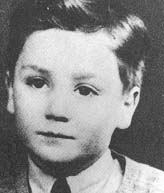 JOHN WINSTON LENNON
JOHN WINSTON LENNON